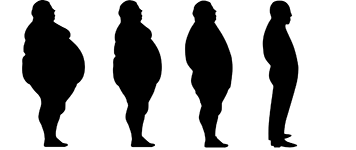If the basic philosophy is right, there is no one who cannot lose weight when guided correctly!
In the modern world, people struggle with the problem of weight. However, in recent years, many false statements have been developed on this subject. The most wrong of the scientifically unfounded and illogical discourses, especially coming from America, is to eat little and often, this is a great betrayal of health, its other name is piggishness! A person is not fed 6-7 times a day!
In the past, until the 1950s, people generally ate two meals a day, and it was a shame to eat something in between! Looking at the photographs taken in groups of young and old people in the 1950s and 60s, the striking point is that there were no fat people among them. These People were not poor, and there were no dietitians and diet books in those years. At those times, people ate enough for an average of two meals a day and did not snack in between!

The first principle to lose weight in a healthy way is eating two meals a day, which is enough for everyone. There is an important urban legend, if you go out on the street and ask what is the most important meal of the day, ninety percent will say breakfast! There is no harm in breakfast, but it is not necessary and it is not the most important meal of the day. This is a slogan taken from an advertising campaign for a breakfast cereal company in the 1950s. If you are not overweight, if you do not have sugar or cholesterol problems and you want to have breakfast, it is okay but not necessary, do not expect any special benefit from it. See
Breakfast chapter for more information.
In general, the
healthiest diet is one that is eaten two meals a day. However, the quality of what is eaten is also very important, creating a healthy diet rich in fruits, vegetables, salads, legumes and complex carbohydrates and fiber should be the main goal.
Also, fasting from time to time gives the body the rest and regeneration time it needs. An easier way to fast is intermittent fasting. Intermittent fasting and a program based on healthy eating and movement allow the
metabolism to return to normal. When metabolism works normally, weight, sugar and cholesterol are regulated. The biggest harm done to people by eating little and often is that no matter how little or healthy one eats, every piece of food causes insulin secretion, and when this continues,
insulin resistance develops. Insulin resistance is the first step of diabetes and the cells begin to ignore insulin after a while. When eating little and often and snacks are left, the pancreas and the liver rests, and numerous benefits are provided.
The principle of
intermittent fasting is a very important principle that came to the fore 5-10 years ago. There is a tradition of fasting in all religions and cultures, and the effects of fasting on human health are mentioned. The Science World has just discovered this! When no calories are taken for a certain period of time by fasting, a mechanism called
autophagy begins to work in the cells at the 14th hour of not consuming calories. Autophagy is a cleaning action performed by cell scavengers called lysosomes. Worn proteins and organelles in cells are renewed and replaced with fresh ones. Autophagy is also an act of recycling and rejuvenation.
When fasting or intermittent fasting, the liver and pancreas rest, the insulin resistance in the cells is broken, the cells become more sensitive to insulin, and most importantly, the energy metabolism of the cells is accelerated, sugar and foods are burned faster and used more effectively.
It is very important to give the body a chance to repair and heal itself every day. It is very useful and not very difficult not to eat at certain time intervals, for example 12, 14, 16 hours. In this way, processes such as autophagy, mitophagy, waste disposal, cleaning, recycling of old parts take place in the body. Stem cell production and
antioxidant enzymes increase,
inflammation decreases. It provides support to brain chemistry, bone density and muscle mass. Insulin resistance and abdominal fat are reduced. That's why daily care and repair is very important as well as medical treatment. For example, every day household garbage is brought out to the door, but unless someone comes and picks it up, it piles up and makes a mess. Eating constantly has just such an effect on the body. It is necessary to stop, take a break, give the body time to repair and heal. Thus, life expectancy is extended and the risk of chronic diseases is reduced.
The principle of intermittent fasting foresees not consuming calories for 16 hours, the method is quite simple, nothing to eat after 8 pm. Anyway no one should eat after 8 pm. Eating again after eight in the evening is difficult to digest, disrupts
sleep quality, causes reflux if we have a tendency... If we go to bed at 12 o'clock, 4 hours are gained, if 8 hours are spent asleep, 12 hours, if breakfast is skipped and the first meal is eaten at noon, the total will be 16 hours. Here is the 4 hours between 8 am and 12 noon, the time when autophagy starts and metabolism goes into fat burning mode. If you do a 30-minute walk in these 4 hours, fat burning will increase a lot. This is the key to losing weight.
Excess weight is caused by an imbalance between calories eaten and calories burned. If more calories are taken than burned, weight is gained. For example, the caloric value of a bowl of salad is 50 calories, while a slice of cream cake is about 300-400 calories!
The main approach of weight loss diets is calorie restriction, that is, food restriction. With this method, since people are hungry and do not feel satiated, their metabolism goes into hunger mode, and to protect itself slows down. So it is not possible to deceive the metabolism by eating less, but the metabolism can be deceived by eating too much. For example, eating a large bowl of salad is satiating enough, so the metabolism does not perceive any hunger and works normally.
Scientific studies on people who have tried a dietitian diet many times, and tried to lose weight by eating little and often, that is, the way of calorie restriction, show that the success rate of these weight loss diets is at most 9 percent at the end. About half of those who start diets give up in the first 10-15 days, the remaining fifty percent can lose weight as much as they put in, but unfortunately, the lost weight is regained very quickly. As a result, only 9 percent of those who enter such a weight loss diet are successful.
However, when such unsuccessful attempts are repeated and different dietitian prescriptions are tried, people get psychological stress and resort to unnecessary bariatric surgery methods. Einstein had a nice saying: Stupidity or insanity means doing the same thing and expecting different results! When the basic philosophy is wrong, given programs fail. There is no person who cannot lose weight when guided correctly.
With a successful weight loss process, even diseases such as
diabetes,
cholesterol,
hypertension and heart disease may regress, and health can be restored!
Vegetables, salads and fruits, which are low in calories, are very rich in vitamins, minerals and antioxidants. It is very important for our general health that we get around 5 servings of these foods in a day (1 medium apple or 150 - 200 g vegetables, or salad is considered 1 portion). The most important benefit of such a diet is fiber. As a result of a total of 185 studies carried out by the World Health Organization with various scientific organizations over 40 years, it was found that the rate of developing cardiovascular diseases, diabetes and cancers is 15% - %35 less in people who follow a diet rich in fiber such as fruits, vegetables, salads, legumes, whole grains...
The way to eat healthy and lose weight, is eating foods rich in fiber. The foods richest in fiber are:
Every 100 grams;
Peas 16 grams,
Lentils 16 grams,
Kidney beans 15 grams,
Broccoli 10 grams,
Oatmeal 5 grams,
Whole Wheat Pasta 6 grams,
Whole Wheat Bread (1 slice) 3 grams,
Apple / Pear (1 medium size) 5 grams,
Walnuts / Almonds (50 grams) contain 6 grams of fiber.
Vegetables such as zucchini, leeks, and spinach also contain plenty of fiber.
In fact, fiber cannot be digested by the human digestive system, but it is the most important nutrient for probiotic bacteria in the intestines. These bacteria take the fiber as food and in return produce some beneficial oils called short-chain fatty acids and nourish the intestinal walls, ensuring that they are healthy and protected against bowel cancers. In addition, these short-chain fatty acids, as bituric acid, acetic acid, have beneficial effects like
Omega 3 fatty acids when mixed with the blood. First of all, they suppress the appetite hormone in the brain, balance the sugar and cholesterol levels, make beneficial contributions to cardiovascular health, reduce inflammation and regulate the flow in the vessels.
Apetite and Hunger - Hormones
Many scientific organizations recommend taking 25-30 grams of fiber a day, and there is no harm in excess. In fact, consuming 40-50 grams of fiber a day is an extremely beneficial habit. The most suitable diet to meet this need is the
Mediterranean diet. In the Mediterranean diet, foods rich in animal fats, proteins and sugar are the least consumed, and fiber-rich foods such as legumes, cereals, nuts, fruits, vegetables and salads are the foods that are consumed the most. Mediterranean style diet will create the healthiest nutrition level.
There is no single weight loss superfood, but the most important elements of losing weight and maintaining weight balance are foods with fiber, such as fruits, vegetables, salads and legumes. Such a balanced diet also feeds the beneficial probiotic bacteria in the intestines. Probiotic bacteria are extremely effective on sugar and cholesterol metabolism. Without a rich probiotic bacteria environment, it is not possible to have
healthy intestines, and without gut health, it is not possible to be healthy!
The weight loss process is not too difficult, even if it requires some effort and some changes in daily life, everyone can get rid of their excess weight.
Intermittent fasting method is the easiest program to implement. Within the specified period, for example 30 days, there is no prohibition other than alcohol and sweets, one can eat whatever is desired in two meals, nothing is eaten in between, and weight is lost without calculating calories.
It is not possible to lose 20-30 kilos in a week, and it is not healthy either. Scientific guidelines recommend losing a maximum of three to four kilos a week. A 100 kilos person loses about 10 kilos in a month.
There are some measurement methods, the most used measurement is called Body Mass Index, there are applications that automatically calculate the BMI on the internet, but these are not very accurate measurements, first of all, these measurements do not take into account the age, the body mass indexes of a 20-year-old and a 50-year-old are different, On the other hand, the composition of the body is not taken into account, so both people are 80 kilos, but one of them has a belly, his weight comes from fat, the other is an Olympic athlete and his weight comes from muscles. Therefore, body mass index is not a precise measurement, it just gives an idea.

Another criterion is the waist circumference measurement, which gives an idea. Waist circumference is something that should be known as a disease risk factor, especially since it also shows visceral fat. It is considered normal up to 100-105 cm in men and 90 cm in women. However, this also has a shortcoming, it does not take into account the height! For example, if someone's height is 1.75 cm, waist measurement is 105 cm, so he has a serious belly, but if he were 1.85 - 1.90 cm tall, that belly wouldn't be so visible.
The method that will give slightly more accurate results is to divide the waist circumference measurement by the height. For example, if the waist circumference is 100 cm and the height is 180 cm, the measurement result is 0.55. A range of 0.50 - 0.55 is considered normal. The most accurate results are found by Body Mass Analysis in health institutions.
Finally, there is a serious relationship between sleep patterns and weight gain. Scientific studies show that sleep is not just a process in which we rest our body and brain, on the contrary, it is a very active process that affects our health biochemically. An analysis of more than 20 scientific studies examining 100,000 people shows that, in adults or children, insufficient sleep increases the risk of weight gain and
obesity by about 41 percent. Please take a look at
good sleep section for more information.
As a result,
There are countless benefits to fasting one day a week, or intermittent fasting at least three days a week,
Artificial sweeteners should never be used for weight loss.
The most important cornerstone of weight loss is movement. No diet program can be successful without regular walking, exercise and movement.
While dealing with Excess Weight, boost your Nitric Oxide, Antioxidants and Omega 3 levels with
Wellness Triangle which will also prevent cell deformation, protect heart and cardiovascular health, improve immune response, and prolong your life span. After only 30 days of regular use, you will easily notice the changes on your body, but better is to get a blood test at the beginning and at the end of the cure to see all the regenerations on the results. Take action today, improve your health, enhance your life quality... tomorrow may be too late!
Wellness Triangle is the best supplement, a complete support, unique in the world, that provides a healthy living with the regular use of only 3 products.
Learn MoreBack to Home














